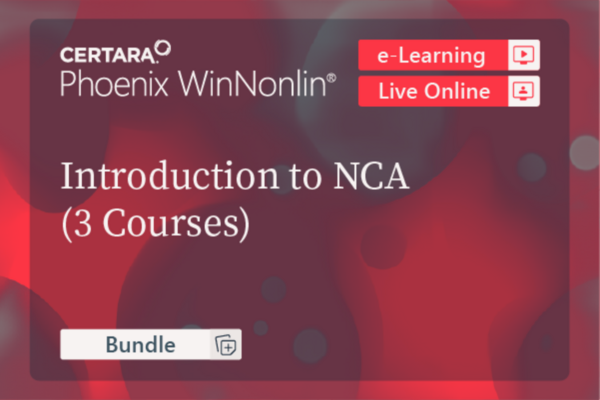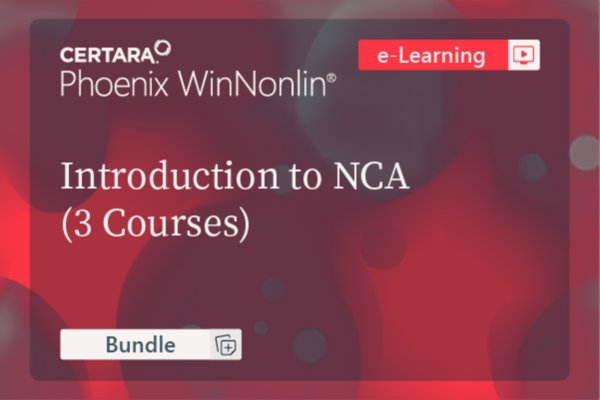
Bundle Cost - $900 ($450 Academia, $225 Africa/India) This bundle is recommended for scientists who want to earn the Certara NCA certification and who are new to pharmacokinetics. Those who successfully complete the certification course will earn the following certification: Certara Certified NCA Analyst using Phoenix WinNonlin Version 8.3 This bundle includes three courses: two conceptual courses (delivered in e-learning format) and one certification course (delivered live online). The certification exams are included in the certification courses. If purchased separately, the three courses would cost $1148, so you can save $248 by purchasing the bundle. Courses Included (see Content Tab for details) (103-OD) Fundamentals of Pharmacokinetics [Conceptual Course] | e-learning format (105-OD) Noncompartmental Data Analysis [Conceptual Course] | e-learning format (122-LIVE-CERT) Phoenix WinNonlin (Part 1) NCA Certification Course | live online format Read more

Bundle Cost - $900 ($450 Academia, $225 Africa/India) This bundle is recommended for scientists who want to earn the Certara NCA certification and who are new to pharmacokinetics. Those who successfully complete the certification course will earn the following certification: Certara Certified NCA Analyst using Phoenix WinNonlin Version 8.3 This bundle includes three courses: two conceptual courses and one certification course. All the courses in this bundle are delivered in an e-learning format. The certification exam is included in the certification course. If purchased separately, the three courses would cost $1148, so you can save $248 by purchasing the bundle. Courses Included (see Content Tab for details) (103-OD) Fundamentals of Pharmacokinetics [Conceptual Course] | e-learning format (105-OD) Noncompartmental Data Analysis [Conceptual Course] | e-learning format (122-OD-CERT) Phoenix WinNonlin (Part 1) NCA Certification Course | e-learning format Read more

Bundle Cost - $1400 ($700 Academia, $350 Africa/India) This bundle is recommended for scientists who want to earn the certifications for both NCA and PK/PD modeling, and who are new to pharmacokinetics. Those who successfully complete the certification courses will earn the following certifications: Certara Certified NCA Analyst using Phoenix WinNonlin Version 8.3 Certara Certified PK/PD Modeler using Phoenix WinNonlin 8.4 This bundle includes four courses: two conceptual courses and two certification courses. All the courses in this bundle are delivered in an e-learning format. The certification exams are included in the certification courses. If purchased separately, the four courses would cost $1698, so you can save $298 by purchasing the bundle. Courses Included (see Content Tab for details) (103-OD) Fundamentals of Pharmacokinetics [Conceptual Course] | e-learning (105-OD) Noncompartmental Data Analysis [Conceptual Course] | e-learning (122-OD-CERT) Phoenix WinNonlin (Part 1) NCA Certification Course | e-learning (123-OD-CERT) Phoenix WinNonlin (Part 2) PK/PD Modeling Certification Course | e-Learning Read more

Bundle Cost - $1700 ($850 Academia, $425 Africa/India) This bundle is recommended for scientists who want to earn the certifications for NCA, PK/PD modeling, and population modeling, and who are new to pharmacokinetics. Those who successfully complete the certification courses will earn the following certifications: Certara Certified NCA Analyst using Phoenix WinNonlin Version 8.3 Certara Certified PK/PD Modeler using Phoenix WinNonlin 8.4 Certara Certified Population PK/PD Pharmacometrician (Level 1) using Phoenix NLME 8.0/8.1/8.2 This bundle includes five courses: two conceptual courses and three certification courses. All the courses in this bundle are delivered in an e-learning format. The certification exams are included in the certification courses. If purchased separately, the five courses would cost $2250, so you can save $550 by purchasing the bundle. Courses Included (see Content Tab for details) (103-OD) Fundamentals of Pharmacokinetics [Conceptual Course] | e-learning (105-OD) Noncompartmental Data Analysis [Conceptual Course] | e-learning (122-OD-CERT) Phoenix WinNonlin (Part 1) NCA Certification Course | e-learning (123-OD-CERT) Phoenix WinNonlin (Part 2) PK/PD Modeling Certification Course | e-learning (124-OD-CERT) Phoenix NLME Population Modeling Certification Course | e-Learning Read more

Complimentary Phoenix Templates for Bioequivalence. Several easy-to-use Phoenix templates, that require minimum user input, have been developed to address a series of BE regulatory guidances. In this course, we discuss the purpose of each Phoenix workflow template, show you how to download templates, and teach you and how to use them. Course Content: Module 1: Template Downloads Module 2: Assessing Reference Scaled Average Bioequivalence (RSABE) for Highly Variable Drugs (HVD) - FDA + EMA Module 3: Assessing Reference Scaled Average Bioequivalence (RSABE) for Narrow Therapeutic Index Drugs (NTID) - FDA Module 4: Assessing Bioequivalence to Methylphenidate Hydrochloride (Concerta) - FDA Module 5: Assessing ABE and PBE for In Vitro Data of Inhaled Products (Guidance on Budesonide) - FDA Read more

Cost - Free PML-School: Learn How to Build Custom PK and PK/PD Models in Phoenix WinNonlin In this series of videos you will learn how to create models using Phoenix Modeling Language (PML). These are the recordings of the PML school webinars which can also be found on the Phoenix Support Forum. Read more
Shopping Cart
Your cart is empty
